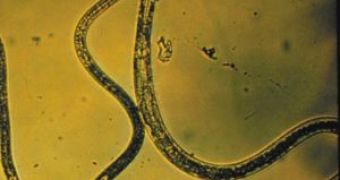Nematodes are a group of worms that mostly parasites on plants and animals.
In humans, many are intestinal parasites (ascariasis worm, pinworm, whipworm) but some, entering into the blood and organs, produce much more serious conditions like elephantiasis, trichinosis, dracunculiasis and others.
Those parasitical to plants are microscopical and can be amongst most destructive pathogens of cultivated plants.
Richard Hussey, professor at University of Georgia, a distinguished research professor in plant pathology at the UGA College of Agricultural and Environmental Sciences, has spent 20 years to discover a way to stop the damages caused by nematodes.
"Root-knot nematodes are the most economically important group of plant-parasitic nematodes worldwide," said Hussey. Nematodes attack nearly every crop and about 2,000 plant species in all.
The worms invade plant roots inducing the formation of large galls (knots) damaging the crop and reducing its yields. There can be thousands of microscopic worms in a square centimeter of soil.
The discovery "has the potential to revolutionize root-knot resistance in all crops," Hussey said.
"The most cost-effective and sustainable management tactic for preventing root-knot nematode damage and reducing growers' losses," he said," is to develop resistant plants that prevent the nematode from feeding on the roots."
Root-knot nematode resistance doesn't occur naturally in most crops, so Hussey's group bioengineered their own.
The lack of natural resistance in plants means that annually, great amount of environmental harmful and costly nematocids must be used. This will change.
Four common root-knot nematode species account for 95 % of all agricultural infestations.
The team discovered the gene essential for the nematode to infect crops and have developed a resistance gene effective against all four species.
Using RNA interference, the researchers have effectively turned the nematode's biology against itself.
They engineered genetically Arabidopsis, a model plant, to produce double-stranded RNA to knock out the specific parasitism gene in the nematode and disrupt its ability to infect plants.
"No natural root-knot resistance gene has this effective range of root-knot nematode resistance," Hussey said.
The scientists focused on understanding the molecular tools the nematode uses to infect plants.
"Our results of in-plant RNA interference silencing of a parasitism gene in root-knot nematodes provides a way to develop crops with broad resistance to this destructive pathogen," Hussey said.
"Equally important, our approach makes available a strategy for developing root-knot-nematode-resistant crops for which natural resistance genes do not exist."

 14 DAY TRIAL //
14 DAY TRIAL // 
